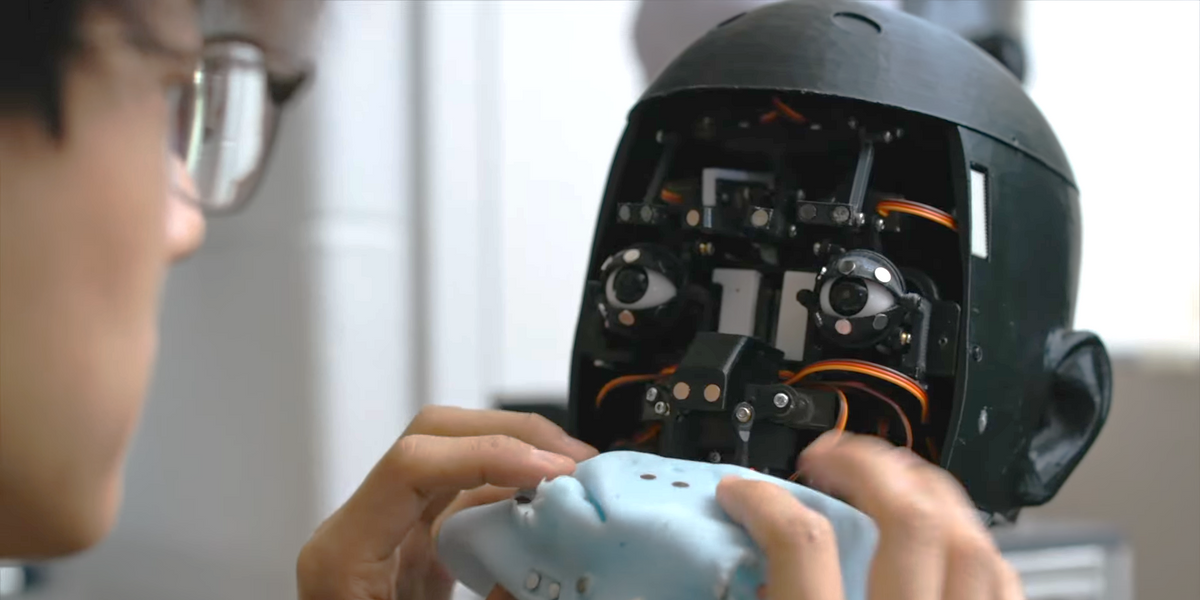Video Friday: Co-Expression
by Evan Ackerman from IEEE Spectrum on (#6KQ80)

Video Friday is your weekly selection of awesome robotics videos, collected by your friends at IEEE Spectrum robotics. We also post a weekly calendar of upcoming robotics events for the next few months. Please send us your events for inclusion.
Enjoy today's videos!
Columbia engineers build Emo, a silicon-clad robotic face that makes eye contact and uses two AI models to anticipate and replicate a person's smile before the person actually smiles-a major advance in robots predicting human facial expressions accurately, improving interactions, and building trust between humans and robots.
[ Columbia ]
Researchers at Stanford University have invented a way to augment electric motors to make them much more efficient at performing dynamic movements through a new type of actuator, a device that uses energy to make things move. Their actuator, published 20 March in Science Robotics, uses springs and clutches to accomplish a variety of tasks with a fraction of the energy usage of a typical electric motor.
[ Stanford ]
I'm sorry, but the world does not need more drummers.
Always good to see NASA's Valakyrie doing research.
[ NASA ]
In challenging terrains, constructing structures such as antennas and cable-car masts often requires the use of helicopters to transport loads via ropes.Challenging this paradigm, we present Geranos: a specialized multirotor Unmanned Aerial Vehicle (UAV) designed to enhance aerial transportation and assembly. Our experimental demonstration mimicking antenna/cable-car mast installations showcases Geranos ability in stacking poles (3 kilograms, 2 meters long) with remarkable sub-5 centimeter placement accuracy, without the need of human manual intervention.
[ Paper ]
Flyability's Elios 2 in November 2020 helped researchers inspect Reactor 5 at the Chernobyl nuclear disaster site to determine whether any uranium was present in the area. Prior to this, Reactor 5 had not been investigated since the disaster in 1986.
[ Flyability ]
Various musculoskeletal humanoids have been developed so far. While these humanoids have the advantage of their flexible and redundant bodies that mimic the human body, they are still far from being applied to real-world tasks. One of the reasons for this is the difficulty of bipedal walking in a flexible body. Thus, we developed a musculoskeletal wheeled robot, Musashi-W, by combining a wheeled base and musculoskeletal upper limbs for real-world applications.
[ Paper ]
Thanks, Kento!
A recent trend in industrial robotics is to have robotic manipulators working side-by-side with human operators. A challenging aspect of this coexistence is that the robot is required to reliably solve complex path-planning problems in a dynamically changing environment. To ensure the safety of the human operator while simultaneously achieving efficient task realization, this paper introduces... a scheme [that] can steer the robot arm to the desired end-effector pose in the presence of actuator saturation, limited joint ranges, speed limits, a cluttered static obstacle environment, and moving human collaborators.
[ Paper ]
Thanks, Kelly!
Our mobile manipulator Digit worked continuously for 26 hours split over the 3.5 days of Modex 2024, in Atlanta. Everything was tracked and coordinated by our newest product, Agility Arc, a cloud automation platform.
[ Agility ]
We're building robots that can keep people out of harm's way: Spot enables operators to remotely investigate and de-escalate hazardous situations. Robots have been used in government and public safety applications for decades but Spot's unmatched mobility and intuitive interface is changing incident response for departments in the field today.
[ Boston Dynamics ]
This paper presents a Bistable Aerial Transformer (BAT) robot, a novel morphing hybrid aerial vehicle (HAV) that switches between quadrotor and fixed-wing modes via rapid acceleration and without any additional actuation beyond those required for normal flight.
[ Paper ]
Disney's Baymax frequently takes the spotlight in many research presentations dedicated to soft and secure physical human-robot interaction (pHRI). KIMLAB's recent paper in TRO showcases a step towards realizing the Baymax concept by enveloping the skeletons of PAPRAS (Plug And Play Robotic Arm System) with soft skins and utilizing them for sensory functions.
[ Paper ]
Catch me if you can!
[ CVUT ]
Deep Reinforcement Learning (RL) has demonstrated impressive results in solving complex robotic tasks such as quadruped locomotion. Yet, current solvers fail to produce efficient policies respecting hard constraints. In this work, we advocate for integrating constraints into robot learning and present Constraints as Terminations (CaT), a novel constrained RL algorithm.
[ CaT ]
Why hasn't the dream of having a robot at home to do your chores become a reality yet? With three decades of research expertise in the field, roboticist Ken Goldberg sheds light on the clumsy truth about robots-and what it will take to build more dexterous machines to work in a warehouse or help out at home.
[ TED ]
Designed as a technology demonstration that would perform up to five experimental test flights over a span of 30 days, the Mars helicopter surpassed expectations-repeatedly-only recently completing its mission after having logged an incredible 72 flights over nearly three years. Join us for a live talk to learn how Ingenuity's team used resourcefulness and creativity to transform the rotorcraft from a successful tech demo into a helpful scout for the Perseverance rover, ultimately proving the value of aerial exploration for future interplanetary missions.
[ JPL ]
Please join us for a lively panel discussion featuring GRASP Faculty members Dr. Pratik Chaudhari, Dr. Dinesh Jayaraman, and Dr. Michael Posa. This panel will be moderated by Dr. Kostas Daniilidis around the current hot topic of AI Embodied in Robotics.
[ Penn Engineering ]